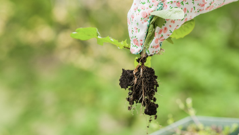
There are lots of benefits from spending time in the garden, such as lowering your stress levels, being more active, getting access to your own fresh flowers and enjoying more sunlight and fresh air. However, if you want to also ensure your lifestyle benefits the earth, you can do this by being a green thumb who is also sustainable. Read on for some ways you can become a greener gardener today.
Create a Compost Heap
For starters, create a compost heap. When you place organic materials into a compost bin instead of in the garbage, you’ll be contributing less waste to landfills each year. This means not only less space being taken up in landfill but also less methane, a greenhouse gas, being released into the atmosphere.
Compost is also helpful because it provides gardeners with a lovely organic material mixture, once items have broken down, which can be used to help gardens retain moisture. Often referred to as “gardener’s gold,” compost reduces the need for the use of chemical fertilizers in landscaping, provides aeration, enriches soil, reduces the likelihood of plant diseases and pest attacks and stimulates the healthy root development of plants.
To get your compost going, position a pile of organic materials on top of soil in a warm, partly sunny spot in your yard. Layer a mixture of materials, alternating between brown items like twigs, branches, dead leaves, paper and cardboard; green waste such as grass clippings, egg shells, vegetable and fruit scraps, coffee grounds etc.; and water, which provides moisture to break down the organic matter. By having this combination of items together, you’ll encourage compost-creating bugs to come into the heap and do their mulching work.
Avoid Chemicals Wherever Possible
As you would imagine, all those chemical-laden products, which many people use in their gardens and on their lawns to kill weeds, fertilize plants and lawn, get rid of the pests and more, can be harmful to the environment. As such, be a greener green thumb by avoiding the use of chemicals wherever possible.
Encourage helpful insect-eating bugs to come into your yard, so you don’t need to spray nasties around. Lacewings and ladybugs eat aphids, for example, and can be enticed in with bright flowers such as sunflowers, marigolds and candytuft. Birds, too, often get rid of pests, particularly plant-destroying ones like snails, caterpillars, grubs and garden slugs. Consider installing nesting boxes and birdfeeders to get more birds spending time in your yard.
Another way to avoid having to spray chemical pest control is to place barriers around your plants to ward off any intruders. For example, grit and crushed eggshells will help to keep garden slugs and snails away from their preferred plant options.

You can take more sustainable steps with weed control, too. For instance, place mulch (such as compost, straw, grass clippings, wood chips and the like) around your garden. This will work to smother and inhibit weeds and prevent new seeds from germinating. There are certain weeds you can pull out by hand, too, plus mowing regularly will further help to keep weeds in control. For other problems you need to get rid of, choose organic, more natural weed sprays rather than the particularly toxic, chemical-laden ones.
Reduce Your Water Usage
Another good way to be mindful of the planet when you’re gardening is to watch your water usage. For example, since lawns often require quite a bit of water, especially in summer, you’ll reduce your need for additional watering sessions if you have less lawn and plant easy-care ground cover plants instead, or things like stones and pavers.
In addition, when you do water your plants and grass, do so at the cooler, less sunny times of day. In particular, it pays to water early in the day, well before the sun has reached its highest point. When you do this, it means less water will evaporate, more will be absorbed by your lawn and plants, and you won’t need to water as much as a result.
You can also limit water usage by reusing and harvesting water. For instance, collect water from showers and laundry activities to use on your plants, and/or harvest water through buckets and tanks and the like, so none is wasted when it rains.
